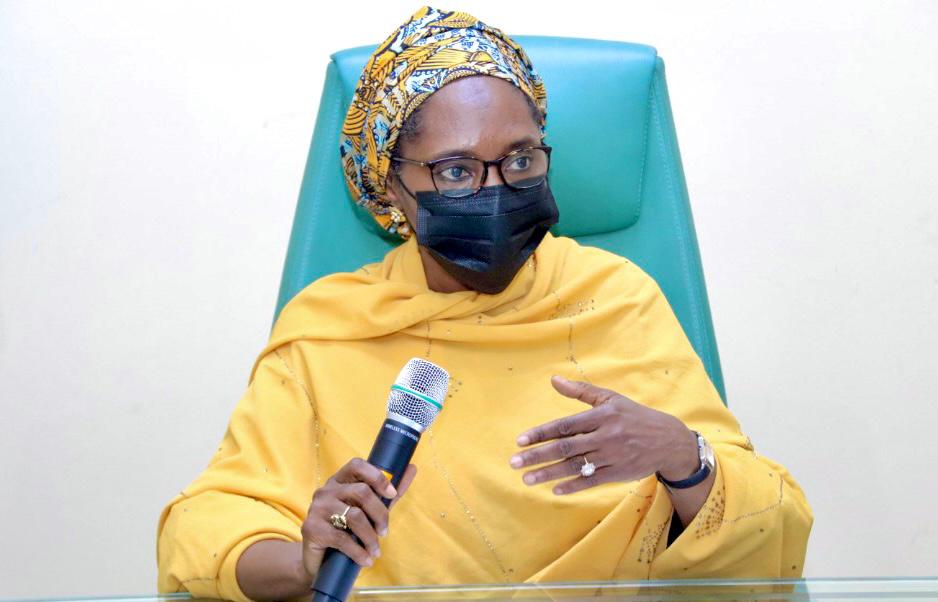The Honourable Minister of Finance, Budget and National Planning, Mrs. Zainab Ahmed, yesterday presented a memo for the approval of the 2022 to 2024 Medium-Term Expenditure Framework and The Fiscal Strategy Paper (MTEF/FSP) as required by the Fiscal Responsibility Act.
Ahmed, who briefed State House Correspondents, said that the MTEF/FSP describes the federal government’s socio-economic and developmental objectives and priorities for the reporting period of 2022 to 2024.
The framework and paper are about the fiscal strategies that the federal government is going to put in place and policies to achieve the priorities, according to her.
Her report highlighted the key drivers of government’s revenue and the spending plans. “The goal for us is to improve the nation’s macroeconomic situation and reposition the economy on the path of inclusive diversified as well as sustainable growth,” she said.
According to her: “The MTEF/FSP consists of medium-term macroeconomic projections, fiscal targets and estimates of revenue and expenditure including government’s financial obligations. We provided to Council, the macroeconomic background base, which we set the estimates that were presented to council.
“Key information is that the Nigerian economy has recovered from a negative growth of -1.8 percent in 2020 to 2.5 percent in 2021, and then to 4.2 percent in 2022. Also, the inflation has moderated from like two months high; it is now moderated and coming down to 17.93 percent. And our foreign reserves stand at $34.2 billion at the end of May, which is $640 million declined from the previous month.
The key macro assumptions that were presented for the Council’s approval is that there will be a crude oil benchmark price of $57 per barrel for 2022, a crude oil production of 1.88 million barrels per day, and a dollar exchange rate of N410.15 to a US dollar, an inflation rate of 13 percent in 2022, and a nominal gross domestic product (GDP) of N149.369 trillion.
What is interesting is that the non-oil GDP continues to grow at N169.69 trillion compared to oil GDP of N14.68 trillion included in the nominal GDP. Nominal consumption is N130,49.36 billion.
In her words: “We have also presented to the federal government the projected revenues for the 2022 to 2024. Specifically for 2022, the revenue that we expect is N6.54 trillion and N2.62 trillion to accrue to the Federation Account and value added tax (VAT) respectively. And then there will be a net oil and gas revenue available for the Federation Account. The Federal Accounts Allocation Committee (FAAC) for distribution will be N6.151 trillion in 2022. This revenue is projected to increase in 2023 to N9.15 trillion.
Mrs. Ahmed said: “The total expenditure that we have projected and approved by the Council is an aggregate expenditure of N13.98 trillion. This includes N1.1 trillion of government owned enterprises (GOEs) expenditure as well as grants and donor funds. The donor funded projects are in the sum of N62.24 billion. This means that this budget is just three percent higher than the 2021 budget, in terms of the size of expenditure.
“We also presented to the Council the budget deficit and the financing items for the expenditure. The budget deficit that is projected for 2022 is N5.62 trillion, up from N5.60 trillion in 2021. This amount represents 3.05 percent of the estimated GDP, which is slightly above the three percent threshold that is specified in the Fiscal Responsibility Act (FRA). The FRA empowers Mr. President to exceed the threshold if, in his opinion, the nation faces national security threats. And it is our opinion and FEC has agreed that we can exceed it.
The deficit is going to be financed by both domestic and foreign borrowings in the sum of N4.89 trillion; and privatisation proceeds of N90.73 billion and drawdowns from existing project tide loans of N635 billion.





